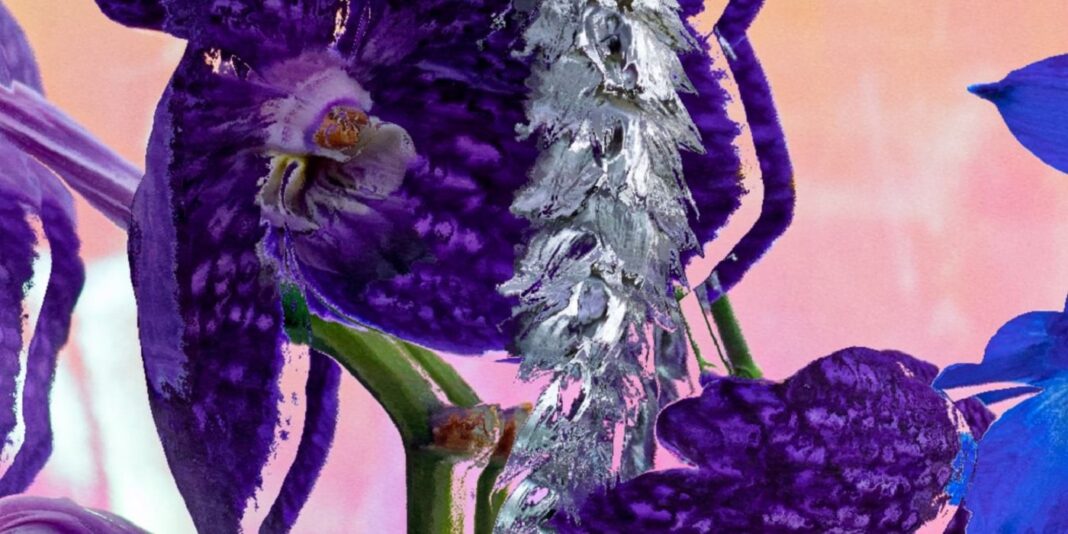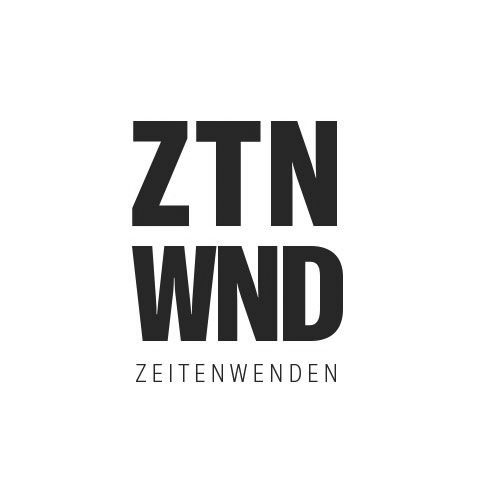From June 2023, Ether’s Bloom will be the first part of the Artificial Intelligence (AI) programme with a series of new projects. These include a writer in residence, artistic explorations of AI, a podcast, lectures and talks. The second part of the programme is the development of an app with a special focus on mediation and accessibility.
Fig. above: Visual – Luis Kürschner, mit freundlicher Unterstützung von Studio Linné
The Ether’s Bloom programme
The title Ether’s Bloom is inspired by Writer in Residence K Allado-McDowell. The programme explores the utopian and poetic possibilities of Artificial Intelligence and enables speculation and new thinking about our relationships to each other, to other living beings and to technology. The programme expands the existing thematic focus of the Gropius Bau and takes a look at non-human intelligences, different notions of care and situated knowledge.
Current AI models tend to hallucinate and provide answers rather than formulate questions, although questions and speculations are central to creative work and discourse. Ether’s Bloom focuses on artistic designs and speculations on AI in close collaboration with artists, writers and scientists.
From June 2023, K Allado-McDowell will be the first Writer in Residence at the Gropius Bau to explore AI in depth.
From 10 August 2023, a series of artistic works on the theme of AI will be on display on the ground floor and from autumn on the ground floor of the Gropius Bau.
A significant part of the programme consists of workshops, talks and conversations for shared learning and exchange. With the AI podcast Beyond and Within: AI Talks, the programme takes listeners on a journey of questions, imaginings and investigations. It explores different perspectives on rapidly evolving technologies and addresses feelings, institutional spaces and art, embodiment and questions about living with technology in the future.
Ether’s Bloom aims to open up discussions about Artificial Intelligence, its ethics and practices, taking a cross-generational and intersectional perspective.
A newly developed app
The second part of the programme consists of the development of an app that is partly AI-supported. It offers structural tools to make visiting the Gropius Bau more accessible. The app, which will emerge in part from the various activities in the context of Ether’s Bloom, focuses on accessibility and different forms of intelligence and is designed as an important complement to the Gropius Bau’s existing education programme. It supports usability and shared learning between users and visitors and provides an infrastructure for AI-based educational formats that is sustainable and future-proof.
Writer in Residence of the Gropius Bau in 2023: K Allado-McDowell
“It’s the end of explanations, a great increase in reality is here.”
— K Allado-McDowell und GPT-3
The Gropius Bau welcomes K Allado-McDowell as the first Writer in Residence and an integral part of the Ether’s Bloom programme. Allado-McDowell is considered an innovator in the collaborative use of AI and machine learning for co-creative and literary work. As the first Writer in Residence, Allado-McDowell will publish new essays from June to August 2023. A writer, speaker and musician, Allado-McDowell co-authored Pharmako-AI (2020), Amor Cringe (2022) and Air Age Blueprint (2023) with GPT-3 and co-edited The Atlas of Anomalous AI (2020). Allado-McDowell founded the Artists + Machine Intelligence programme at Google AI.
The Writer in Residence programme offers a digital space to write and publish texts on Artificial Intelligence as part of a three-month collaboration with the Gropius Bau Journal. The bilingual online platform explores the interwoven future and the possibilities of thinking and living together in essays, interviews and artistic texts. During the residency at Gropius Bau, Allado-McDowell will focus on texts that challenge, rethink, subvert, collaborate and intermingle with learning algorithms. Allado-McDowell’s contributions to the Gropius Bau Journal revolve around the question of how technology can enable a shared future for different species, and aim to make the complex dimensions of artificial intelligence accessible to a wider audience.
Artistic works on relationships with technologies
From 10 August 2023, the Gropius Bau will show a series of artistic works that deal with AI. Works by Elisa Giardina Papa, Mimi Ọnụọha, Patricia Domínguez and a new augmented reality work by kennedy+swan will be presented successively in the Gropius Bau.
Elisa Giardina Papa‘s work explores how extractive forms of AI capitalism strain our imagination, desire and labour. Through a political yet poetic framing, she draws attention to aspects of our lives that remain radically unruly, untranslatable and unpredictable despite everything. Her video trilogy Cleaning Emotional Data (2020), Labor of Sleep and Technologies of Care (2016) explore how labour and care are being reshaped by digital economies and artificial intelligence.
Mimi Ọnụọha explores the gaps in systems of work, ecology and relationships and questions notions of progress that affect digital and archival media. The short film These Networks in Our Skin (2021) shows women reconnecting network cables to re-format the world. It opens up new paradigms for the experiences of Black and Indigenous people and hybrid histories. By showing how the cables of history are re-networked, the artist explores a ritual of awakening, trust and forgotten narratives.
As part of a work created especially for Ether’s Bloom, the Berlin duo kennedy+swan present a new series of augmented watercolours that address non-human intelligence. Visitors can scan the works with an augmented reality app and thus enter a predominantly analogue but also digital world that – with the help of new AI algorithms – enables more understanding of and access to communication between humans and animals. Here, machine learning reveals the hidden messages of nature’s multiple languages and enables a dialogue between “us” and “them”. kennedy+swan’s 3D scans of handmade miniatures and landscape models add a new layer to the watercolours and reveal the constructive power of upcoming AI systems.
Patricia Domínguez‘s Madre Drone (2019-2020) highlights the daily struggle of indigenous and non-indigenous communities to protect their territories. Domínguez creates a myth of shared, cross-species resistance that gives rise to a new vision of cosmological and technological sensitivity and collective resilience.
Accompanying Ether’s Bloom is the thinking and reflection of cultural scholar, researcher and author Maya Indira Ganesh, who is present throughout the year with new content and publications in various forms.
WHERE?
Gropius Bau
Niederkirchnerstraße 7
10963 Berlin
WHEN?
Thu, 10.8.2023- Sun, 14.1.2024
Mon, Wed, Thu, Fri 11:00-19:00
Sat, Sun 10:00-19:00
Tue closed
COSTS?
Admission to the programme is free of charge.






